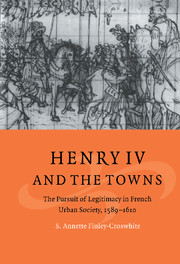Book contents
- Frontmatter
- Contents
- List of illustrations
- List of tables
- Acknowledgements
- Introduction
- 1 France in the 1580s and 1590s
- 2 Brokering clemency in 1594: the case of Amiens
- 3 Henry IV's ceremonial entries: the remaking of a king
- 4 Henry IV and municipal franchises in Catholic League towns
- 5 Henry IV and municipal franchises in royalist and Protestant towns
- 6 Clientage and clemency: the making of municipal officials
- 7 Urban protest in Poitiers and Limoges: the pancarte riots
- 8 Municipal finance and debt: the case of Lyons
- Conclusion: Henry IV, urban autonomy, and French absolutism
- Bibliography
- Index
- CAMBRIDGE STUDIES IN EARLY MODERN HISTORY
7 - Urban protest in Poitiers and Limoges: the pancarte riots
Published online by Cambridge University Press: 02 November 2009
- Frontmatter
- Contents
- List of illustrations
- List of tables
- Acknowledgements
- Introduction
- 1 France in the 1580s and 1590s
- 2 Brokering clemency in 1594: the case of Amiens
- 3 Henry IV's ceremonial entries: the remaking of a king
- 4 Henry IV and municipal franchises in Catholic League towns
- 5 Henry IV and municipal franchises in royalist and Protestant towns
- 6 Clientage and clemency: the making of municipal officials
- 7 Urban protest in Poitiers and Limoges: the pancarte riots
- 8 Municipal finance and debt: the case of Lyons
- Conclusion: Henry IV, urban autonomy, and French absolutism
- Bibliography
- Index
- CAMBRIDGE STUDIES IN EARLY MODERN HISTORY
Summary
Even after the peace settlement of 1598, the internal dynamics of urban life were turbulent. Small, localized riots occurred frequently in the late sixteenth and early seventeenth centuries and reflected the collective way townspeople expressed their anger. Popular defiance challenged local and Crown authority, and the repercussions of its use were often costly. During Henry's reign, urban riots in Poitiers and Limoges broke out in response to a new tax on towns the Crown briefly collected. In repressing the riots, Henry disciplined the rebellious towns by revoking their privileges. This chapter continues a major theme of the book in emphasizing that Henry's relationship with his towns incorporated a detailed understanding of local affairs which he used in problem solving. When Henry disciplined his towns, he also tried to ease anxieties that resulted from the Wars of Religion and still occasionally erupted into violence. In Limoges, in particular, Henry's settlement of a local crisis reiterated his post-League policy of reconciliation by permitting ex-Leaguers to return to the Hôtel de Ville as a way of stabilizing a town still troubled by religious unrest. In addition, tax riots were sometimes a last step in fiscal negotiations in which the king asked for a specific amount of money in a tax or loan and then accepted a reduced amount as a compromise. The riots were meant to reduce the amount that the king was willing to accept. Urban tumult in Poitiers and Limoges thus caused the Crown to repress opposition predictably while simultaneously drawing the king and his agents into the complex webs of human interactions and histories that characterized these early modern towns.
- Type
- Chapter
- Information
- Henry IV and the TownsThe Pursuit of Legitimacy in French Urban Society, 1589–1610, pp. 139 - 161Publisher: Cambridge University PressPrint publication year: 1999



